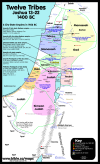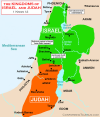74) Looking for Jeremiah
Nebuchadnezzar conquers Israel
During the second year of his reign, Nebuchadnezzar conquered and destroyed the fortified city of Ashkelon, after which he consolidated his authority over the land of Israel.
All the kings of Syria and Israel, including Jehoiakim of Judah, were compelled to pay tribute to nebuchadnezzar. This was a bitter pill for Jehoiakim to swallow as he had been appointed by the Egyptian Pharaoh Necho, a sworn enemy of Nebuchadnezzar.
In 598 BC, after three years of submission to Nebuchadnezzar, King Jehoikim attempted to shake off the yoke of Babylon and pledge allegiance to Egypt. The revolt was suppressed and Jehoiakim was bound in chains, prepared to be taken to babylon. However, he died a horrible death after being dragged through the streets outside Jerusalem, where his corpse was thrown. Jehoiakim’s death fulfilled the prophecy of Jeremiah:
“Therefore, this is what the LORD says about Jehoiakim son of Josiah, king of Judah:”They will not mourn for him: ‘Alas, my brother! Alas, my sister!’ They will not mourn for him: ‘Alas, my master! Alas, his splendor!’
“He will have the burial of a donkey - dragged away and thrown outside the gates of Jerusalem.” - Jeremiah 22:18-19.
After Jehoiakim’s death, his eighteen-year-old son, Jehoiachin became the king of Judah. However, the teenage king reigned for just three months as his reign was cut short when Nebuchadnezzar came down to Jerusalem. He captured all of the country’s officials and tens of thousands of others. He also plundered all the treasures of Solomon’s Temple and the King’s Palace and took them with him to Babylon.
Then nebuchadnezzar appointed Jehoiachin’s uncle, Zedekiah to the throne, and subjugated the neighbouring empires - including Edom, Moab, Ammon, Tyre, and Sidon - to Zedekiah. His reign lasted 11 years, before he, too, conspired with the Egyptians and rebelled against Babylon, despite his promise to remain loyal to Nebuchadnezzar.
Nebuchadnezzar conquers Israel
During the second year of his reign, Nebuchadnezzar conquered and destroyed the fortified city of Ashkelon, after which he consolidated his authority over the land of Israel.
All the kings of Syria and Israel, including Jehoiakim of Judah, were compelled to pay tribute to nebuchadnezzar. This was a bitter pill for Jehoiakim to swallow as he had been appointed by the Egyptian Pharaoh Necho, a sworn enemy of Nebuchadnezzar.
In 598 BC, after three years of submission to Nebuchadnezzar, King Jehoikim attempted to shake off the yoke of Babylon and pledge allegiance to Egypt. The revolt was suppressed and Jehoiakim was bound in chains, prepared to be taken to babylon. However, he died a horrible death after being dragged through the streets outside Jerusalem, where his corpse was thrown. Jehoiakim’s death fulfilled the prophecy of Jeremiah:
“Therefore, this is what the LORD says about Jehoiakim son of Josiah, king of Judah:”They will not mourn for him: ‘Alas, my brother! Alas, my sister!’ They will not mourn for him: ‘Alas, my master! Alas, his splendor!’
“He will have the burial of a donkey - dragged away and thrown outside the gates of Jerusalem.” - Jeremiah 22:18-19.
After Jehoiakim’s death, his eighteen-year-old son, Jehoiachin became the king of Judah. However, the teenage king reigned for just three months as his reign was cut short when Nebuchadnezzar came down to Jerusalem. He captured all of the country’s officials and tens of thousands of others. He also plundered all the treasures of Solomon’s Temple and the King’s Palace and took them with him to Babylon.
Then nebuchadnezzar appointed Jehoiachin’s uncle, Zedekiah to the throne, and subjugated the neighbouring empires - including Edom, Moab, Ammon, Tyre, and Sidon - to Zedekiah. His reign lasted 11 years, before he, too, conspired with the Egyptians and rebelled against Babylon, despite his promise to remain loyal to Nebuchadnezzar.



